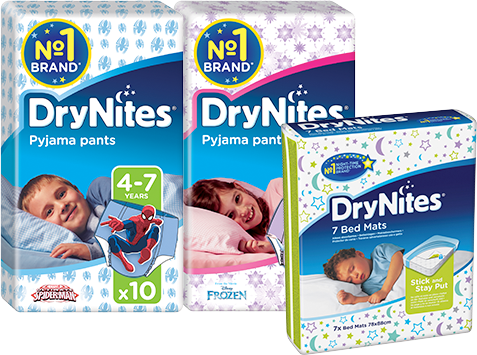Myths
Bedwetting is not something that’s talked about too often. This can lead to false information and inaccurate advice – mostly from well-meaning sources – turning into widely believed “facts”. To help you avoid them, we’ve put together a list of the most commonly encountered bedwetting myths:
Myth #1- If your child is properly toilet trained, they shouldn’t be wetting the bed
Staying dry at night is a separate stage of your child’s development, and is very different from urine control during the day. In most cases, it’s just a matter of time and nothing to worry about.
You shouldn’t blame yourself or think that you didn’t go through the toilet training phase properly. Your child might know when to go to the toilet when they’re awake, but still wet the bed at night. It’s important to remember that this is nobody’s fault.
Myth #2 - Using an absorbent product enables bedwetting
There is no evidence to suggest that using absorbent pants delays or hinders development.
Bedwetting products such as DryNites® Pyjama Pants help make managing this phase easier and can improve sleep quality, boost confidence, and reduce emotional stress (which can actually contribute to bedwetting). All of this helps make bedwetting less of a big deal. Absorbent pyjama pants will also give your child some control over the situation, especially if they have reached sleepover age.
Finally, it’s worth emphasising that these products are not a cure for bedwetting, but tools that help make managing this phase easier.
Myth #3 - Bedwetting is unusual once a child reaches school age
While many kids will have stopped wetting the bed by the time they start school, it is by no means unusual for kids to have not yet become dry at night.
Myth #4 - Children wet the bed when they are too lazy to go to the bathroom
Beyond being untrue, believing this can lead parents to blame their child for wetting the bed, which will only make the situation more difficult to handle. There are a number of reasons why your child may be wetting the bed. These are the most common:
-
Delay in bladder reflex development, meaning your child’s bladder is not signalling the brain to wake up
-
As yet an insufficient amount of anti-diuretic hormone (ADH), which slows down urine production at night, so we don’t have to wake up as much (this can take time to develop in children)
-
A delay in bladder development that can result in low bladder capacity (the amount the bladder can hold before feelings of fullness)
Myth #5 - The cause of bedwetting is the same in all children
There are some common causes of bedwetting, such as a delay in bladder development or a family history of bedwetting. However, each child is unique, and causes can vary.
In some children, particularly those who have been dry at night over a longer period, stress, grief, or other emotional problems can play a part. Our guide to bedwetting causes can help you with more information.
Myth #6 - Your child will eventually grow out of bedwetting, so you can just ignore it
While it’s true that most children will become dry in their own time, it’s also a period where your child needs your support and advice. That’s why it’s important to help them understand that it’s not their fault and to come up with a management plan together, rather than ignore the problem.
Myth #7 - Waking your child in the middle of the night for a bathroom visit will end bedwetting
Often referred to as “lifting”, this is a common practice that involves parents waking their children up at night to encourage them to go to the toilet. It can seem to be a good strategy; however, this method does not help improve your child’s bladder control. It might also disrupt your child’s sleep, especially if they don’t need to urinate when you wake them. If your child is over five, it might also make them feel like they have no control over the situation.


